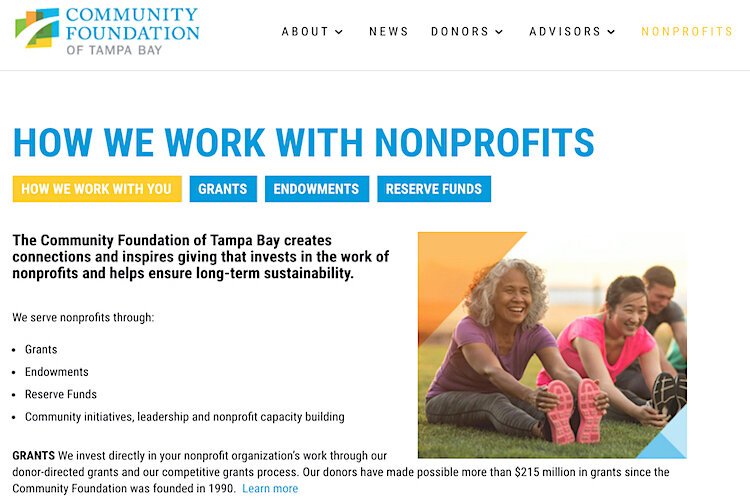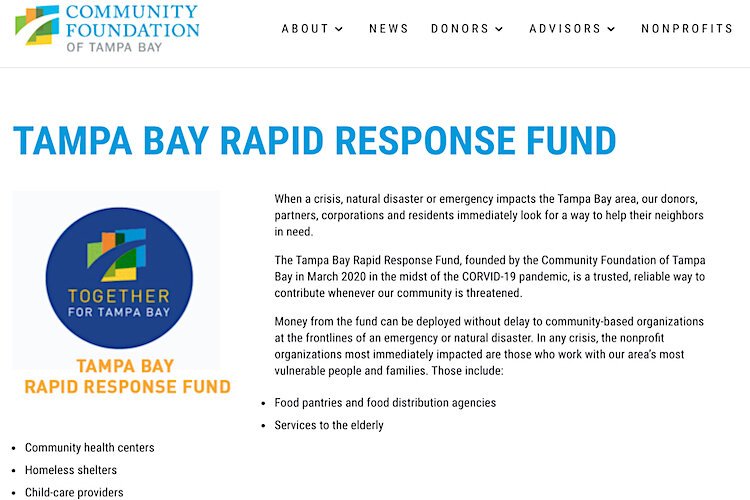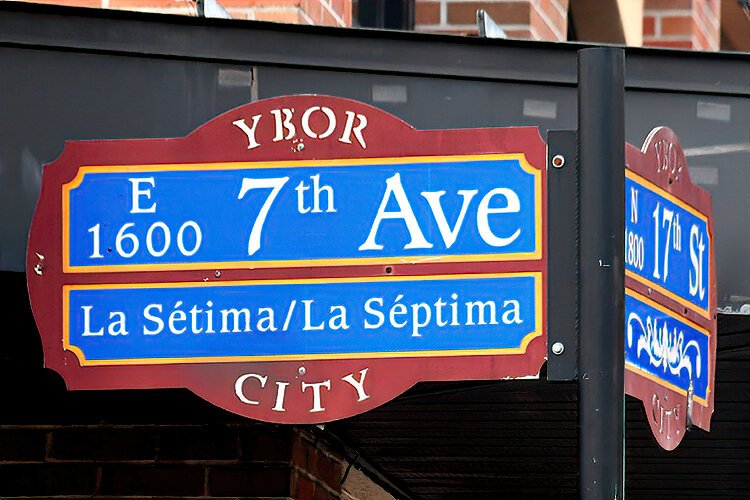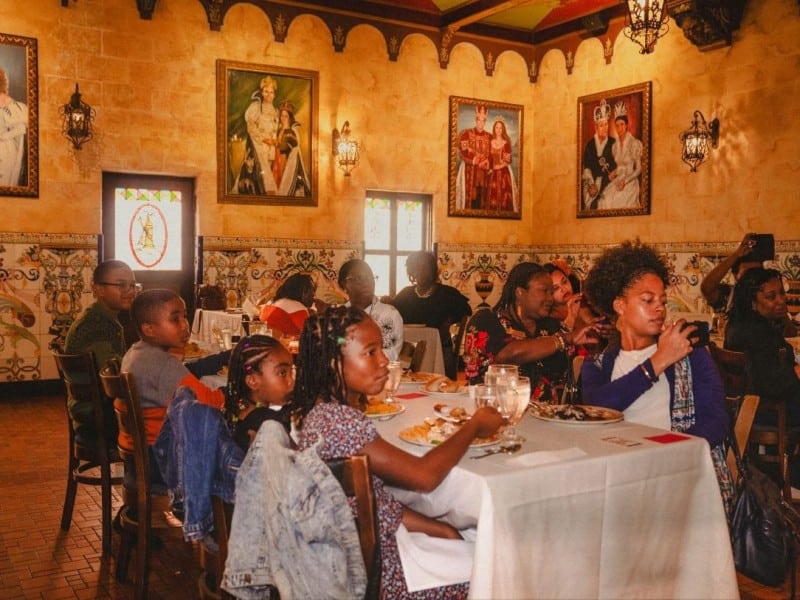Priorities shift for philanthropic groups compelled to innovate post-COVID-19
The nonprofit needs list keeps growing in the Tampa Bay Area as community members struggle in the aftermath of COVID-19. Philanthropic groups are supplying basic needs and providing more targeted services that address education, arts and culture, animal welfare, domestic abuse, housing, financial aid, and job searches.
Two weeks before finalizing grants for 2020, the Community Foundation of Tampa Bay had to put more than 35 nonprofits on pause.
A nearly six-month competitive application process came to a sudden halt in March as the foundation’s leaders confronted an emergency unlike anything, they, or this nation, had faced before. A novel coronavirus, spreading COVID-19, created a global and local health crisis and a financial collapse that sank the economy and put millions out of work.
“We began right away thinking, how are we going to respond?” says Jesse Coraggio, the Foundation’s VP of Community Impact. “We knew there would be a lot of requests.”
Though still committed to distributing traditional grants in the fall, the foundation’s leaders quickly established the Tampa Bay Rapid Response Fund, a Fundholders Match Program, and a “nonprofit needs list.”
The foundation simplified rules to get dollars out the door as soon as possible. From the start, basic needs including food distribution, personal protection gear, such as masks and gloves, and financial aid for rent were at the top of the list.
Many organizations including Feeding Tampa Bay expanded their reach with new food bank locations to meet an overwhelming need among families that lost jobs and income. The Helios Education Foundation, Florida Blue, and the Humana Foundation seeded the rapid response fund with about $175,000.
The Community Foundation serves nonprofits in five counties: Hillsborough, Pinellas, Pasco, Hernando, and Citrus counties. Since 1990 about $250 million in charitable donations were awarded.
More than 700 COVID-19 related requests poured in, totaling about $33.5 million. By the end of August, more than 185 projects had been fully or partly funded, for a total of about $3.1 million. And the matching program secured more than 230 gifts from the foundation’s donors.
In contrast, Coraggio said 278 letters of intent were mailed last October to applicants for its regular grant program.
“That was a record at the time,” he says. “I wish I had $33 million in my back pocket. There are so many good projects coming in.”
The nonprofit needs list keeps growing. From supplying basic needs initially, funds later aided nonprofits providing services that include education, arts and culture, animal welfare, domestic abuse, housing, financial aid, and job searches.
Organizations and projects that received all or part of their requests include:
- Haven of Hope of Hillsborough for food, clothing, and rent
- TampaBay-Job-Links to support job searches and readiness response
- Showered and Empowered for a replacement truck to tow a mobile shower/laundry
- University of Tampa for 3D printing of face shields for local health care workers
- Jobsite Theater’s unemployed artists’ fund
- The Centre for Women for its Tampa Bay Work for Women project
- Dawning Family Services for relief for homeless and at-risk families with minor children
- Elmira’s Wildlife Sanctuary to protect animals and volunteers
Networking gets new attention amid the pandemic
Foundations and charitable organizations always network and share information and ideas. But amid COVID-19 networking is only intensified.
And Coraggio says the pandemic made it critical to post the nonprofits’ needs list on the website for transparency. The list includes projects partially and fully funded, as well as those receiving no funds. If the Community Foundation can’t match a need with a donor, potentially other organizations can fill in the gaps, he adds.
One of the Community Foundation’s partners is the Humana Foundation. As the shutdown began, Humana quickly pledged $50 million for COVID-19 relief nationally. About $2 million went to the Tampa Bay Area, including about $600,000 in donations to the Community Foundation’s rapid response fund.
“We know the need is probably greater than anything we could fill for now,” says Leslie Clements, the foundation’s senior program manager. “We’re always paying attention to what the needs are.”
Earlier in 2020 Humana identified eight communities in the nation, including Tampa Bay, as recipients of its Strategic Community Investment Program. The foundation’s focus is closing gaps in poverty, jobs, and food insecurity. All are key to better access to health care and systemic improvements for marginalized communities.
“It’s something that we were already focused on,” says Clements. “This has re-ignited the fire that we continue to focus our energy on.”
Low- and moderate-income and minority communities also are the everyday focus of United Way Suncoast. These communities struggle to stay afloat financially in the best of times.
“They don’t make enough to make ends meet,” says Jessica Muroff, the agency’s Chief Executive Officer.
They may be just above the poverty line but Muroff says they are one paycheck or medical bill away from economic ruin.
And now a pandemic is knocking on their doors, with food insecurity, rent evictions, and health scares.
With in-person contacts no longer possible, Muroff says the agency had to rethink its service model.
“How do we deliver the services virtually?” she says. “How do we stay communicating with our families virtually?”
Offices in Ybor City closed. Most staff members shifted to working remotely from home. A two-person crew worked on-site fielding phone calls and scheduling virtual meetings.
The United Way Suncoast set up COVID-19 Response and Recovery Fund
.
In March, the April 5K on the Runway fundraiser, sponsored by Tampa International Airport, had to be canceled. But what looked like a loss turned into an outpouring of community support, says Muroff. TIA employees came through with donations. Some race participants opted to convert their entry fees into raffle tickets.
“People still wanted to give,” she says, and the trend continues.
“Over 50 percent of our donations to COVID were brand new donations,” Muroff says. “There was definitely some great generosity from our community.”
With virtual meetings, her staff helped clients file tax forms to quality for income credits. Students got tutoring help virtually. Essential household workers received childcare assistance.
“The biggest need we found was food insecurity. We worked with our food partners to add additional food distribution sites,” Muroff says.
United Way Suncoast also gave $25,000 to the nonprofit 211 Tampa Bay Cares to help people pay rent, mortgages, and utilities.
“We were really listening to our families and watching what happens to eviction moratoriums,” she says.
Nonprofits turn to foundations and individual donors for support
In a world where the annual bread and butter of nonprofits — fundraising luncheons, dinners, and special events — are off limits, foundations are more than ever a vital source for staying afloat financially. The pandemic threatened to shred the charitable safety nets held in place by nonprofits.
And COVID-19 disproportionately hurt the communities most often helped by nonprofits — marginalized, black, brown, and low-income.
For Premier Community Health Care, its annual fundraiser is a lifeline for helping its clients in Hillsborough and Hernando counties. But the 40-year-old nonprofit had to cancel its plans. A local hotel generously returned a deposit for a banquet room, but the agency’s budget took a hit.
The nonprofit’s services include family medicine for children and adults, dental care, behavioral health, women’s health care including obstetrics, care coordination and management, and community outreach.
In place of the fundraiser, Premier sent emails to sponsors and partners that had pledged donations prior to the canceled event, says Cheryl Pollock, Premier’s chief development and communications officer.
The agency also is searching for grants and COVID-19 emergency funds from other sources including the Community Foundation of Tampa Bay. About $30,000 is needed.
One of the hardest adjustments for nonprofits is the loss of human connections. Some things can’t be done virtually.
The American Cancer Society nationally anticipates a budget of about $700 million each year to fund its services, programs, and research grants. The nonprofit’s funds in 2020 will be about $500 million, or a 30 percent loss, due to COVID-19.
One of its signature events — Relay for Life — is on hold, with the possibility that in 2021 it might be safe to revive it.
“We’re still hopeful that these reduced (revenue) numbers will be met,” says Daniel Johnson, managing director for CBIZ and chairman of the American Cancer Society Southwest Florida Area Board. “We’ve never done virtual strides or virtual galas.”
The board serves Tampa Bay and extends into Collier County.
The relays are held usually at grade schools, high schools, or colleges with students as organizers and leaders. More than donations are lost from these cancellations, Johnson says.
The relays are grassroots, community-based opportunities to build long-term support groups for cancer survivors, caregivers, and young people. They also reflect the diversity of the community’s served by the American Cancer Society, he adds.
“Every school that hosted (a Relay for Life) had to cancel this year,” Johnson says. “You don’t get the opportunity to bring people together locally, including cancer survivors. But it’s also the beauty of Relays for Life that brings together cancer survivors, caregivers, and young people.”
The American Cancer Society provides services in support of programs, including the Hope Lodge and Extended Stay Program, Making Strides for Breast Cancer, and Road to Recovery (Rides to Treatment).
Johnson says the nonprofit also distributes research grants, including dollars to Moffitt Cancer Center. And it works to address health inequalities that disproportionately affect low-income black and minority communities.
Technology and social media again are a silver lining even if a small one.
Johnson says connections and relationships are being forged via emails and zoom meetups. It gives everyone a chance to stay in touch frequently. But in-person is much preferred, he says.
Social media also is playing a role in reaching out to potential donors. And one established campaign – Real Men Wear Pink – is more important than ever as the campaign uses social media to expand its outreach and seek to replace funding lost due to COVID-19.
Networking among foundations and nonprofits is routine. But with COVID-19 its importance is paramount.
Humana, for instance, hosts conference calls among various foundations nationwide to share information and ideas on what is needed, and what comes next.
“We are appreciative that they offer that to us,” says Corragio. “We’re all trying to get ahead of something that happens in another community that may happen in your community.”
Everybody is learning new media skills.
“We’ve all become very technology literate in this and even understanding the importance of it,” says Coraggio of the Community Foundation of Tampa Bay. “When you’re isolated at home it’s important to see another face. We need to keep the human connection.”















